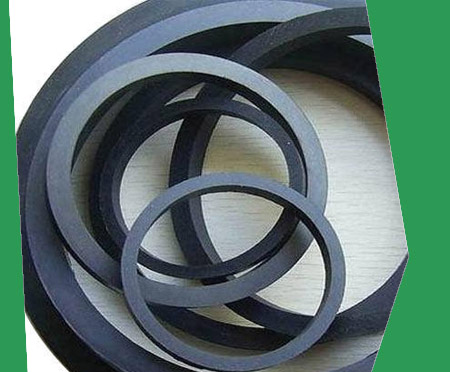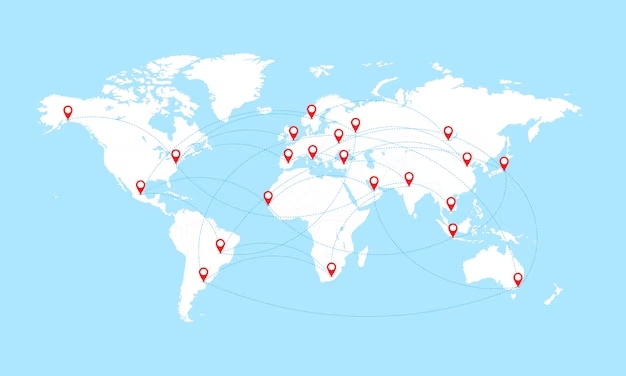
Rubber is the most important class of materials for sealing in the medium temperature range (-50 C to +120 C). This is because rubbers rapidly return to their original shape when any deforming stress or load is removed.
Many rubbers are available for various working conditions; however they all have one property in common – the effect of heat is cumulative and irreversible.
Maximum temperatures must not be exceeded and a good design will allow a safety margin dependent on design service life.
Many rubbers are available in foam (sponge) form for simple gasket sealing applications.

The Rubber sheet materials includes
White FDA Nitrile
Hypalon®
Butyl
Red Rubber(SBR)
Cloth Inserted Rubber
Gum
Diaphragm
Coated Fabrics
Silicone
EPDM (Ethylene Propylene Dimonomer)
Buna-N Nitrile
Neoprene
Fluroelastomer FKM
FFKM
Bridge Pads
Features
A gasket is a mechanical seal which fills the space between two or more mating surfaces, generally to prevent leakage from or into the joined objects while under compression.
Gaskets allow for "less-than-perfect" mating surfaces on machine parts where they can fill irregularities. Gaskets are commonly produced by cutting from sheet materials.
Common Gasket Uses
One of the most common industrial uses of a gasket is acting as a seal for joining two water pipes. You can also find gaskets used to seal boilers and fuel tanks. In all cases the gasket prevents leakage of liquids and gases between the component parts.
Here are few of the common uses for gaskets and the types of gasket used:
Sheet gaskets are ‘punched’ out of a sheet of material (usually a type of synthetic rubber) and are used to seal for pipes and tanks containing chemicals. The sheet gasket is ideal for use with acids, steam and corrosive chemicals.
Ring gaskets are used mainly in off-shore oil and gas pipelines. They are solid rings of metal that operate under extremely high.
Profile gaskets are both flexible and reliable in construction, which makes them highly suitable for use in older seals. These gaskets have a solid metal corrugated core with a flexible covering layer, allowing for high compression levels and a tight seal.
GASKET VS. SEAL: WHAT IS THE DIFFERENCE?
Gasket
Gaskets are used when two flat surfaces of a component or flange are put together. The gasket is placed between the two and is there to prevent leakage. Basically, the gasket makes a static seal between two non-moving items. Whenever a piece of equipment is taken apart, a new gasket should be fitted.
Gaskets are manufactured from a variety of materials including Neoprene, Rubber, Nitrile, Viton, Graphite, Cork, EPDM and SBR. Cork and Graphite are used when the gasket is to be put under high rates of compression.
Gaskets are commonly used in the oil, gas, paper, automotive and electrical industries.
Seals
Seals are used to prevent leakages between two moving parts such as pumps, engine parts and shafts. A seal is generally round and flat, whereas a gasket will often be cut into a specific shape to fit the component it is to be fitted to.
Most seals are constructed of a metal outer ring with an inner rubber surface. This inner surface is tilted to create a lip, creating a second barrier against any drops of liquid that pass the first edge. A seal is often used to seal hydraulic lines and to prevent leakage from the end of a shaft.
Product Specification
Thicknesses Available = (Typically) 1mm, 1.5mm, 2mm, 3mm, 4mm, 6mm, 8mm.
Sheet Size Available = (Typically) 1M x any multiple up to 10M
We can make any customized products
Features

Durable
Highly efficient
Technical Configured
Why Us?

Quick Delivery
Technically Surround
Cost Effective
International Market
• EUROPE: GERMANY, FRANCE, ITALY, UNITED KINGDOM (UK), DENMARK, NETHERLANDS, SWEDEN, SWITZERLAND, NORWAY, CZECH REPUBLIC, LUXEMBORG, IRELAND, AUSTRIA, BELGIUM, POLAND, SPAIN, CROATIA, GREECE, POLAND, ICELAND, HUNGARY, ROMANIA
• UNITED STATES(USA), CANADA, MEXICO
• RUSSIA
• AUSTRALIA AND NEW ZEALAND
• ASIA: JAPAN, SINGAPORE, MALAYSIA, THAILAND, INDONESIA, CHINA
• Middle East AND AFRICA: Saudi Arabia, Kuwait, QATAR, Bahrain Africa: Algeria, Kenya, Tunisia, Angola, Morocco, Senegal, Egypt, Nigeria, Uganda, Libya, Liberia, Swaziland etc


Indian Market
Jammu, Kota, Jalandhar, Jabalpur, Mumbai, Hyderabad, Bareilly, Varanasi, Kolhapur, Pune, Vadodara, Kanpur, Tiruchirappalli, Salem, Nashik, Jaipur, Kolkata, Surat, Delhi, Gorakhpur, Kozhikode, Aligarh, Amravati, Ghaziabad, Bhiwandi, Jamshedpur, Bengaluru, Aurangabad, Ahmedabad, Indore, Hubli Dhanbad, Thiruvanathpuram, Guntur,Guwahati,Patna, Nagpur, Warangal, Dhanbad, Faridabad, Belgaum, Dehradun, Madurai, Amritsar, Chennai, Chandigarh,Durg Bhilai, Meerut, Ludhina, Bhubaneswar, Asansol, Solapur, Agra, Rajkot, Coimbatore, Pondicherry, Bikaner, Bhopal, Moradabad, Vijayawada, Mysore, Allahabad, Cuttack, Jamnagar, Vishapatnam, Ranchi, Srinagar, Tiruppur, Lucknow, Mangalore, Jodhpur, Kochi, Gwalior, Raipur
